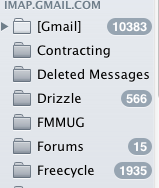I’m not going to lie. I think OS X Lion 10.7.0 is a buggy release. Is it buggier than some other releases of OS X? Possibly. Can Apple fix the bugs, most certainly. But bugs aside, there a few design decisions Apple made that don’t seem fully baked.
First, lets touch on some of the bugs I’ve noticed so far.
Finder is one of those things in OS X that is almost universally disliked for one reason or another. Finder in Lion has a new feature where it just stops doing things at all. At times disk usage stops being updated and it won’t actually copy files. While a restart of Finder resolves this issue, it’s odd that it is there at all.
Wi-Fi, formerly known as AirPort, has a strange tendency to just not connect after resuming from sleep. That said, when it is connected I find it to be more reliable with more stable throughput.
Launchpad, the iOS like view of your installed applications has a tendency at times to lag heavily when launching an app.
There are a number of other smaller bugs that exist in Lion that are a bit grating but I have faith that Apple will fix them in short order. Leopard was initially, at least in my opinion, unusable after the initial installation and I found myself going back to Tiger a couple of times. Apple fixed those issues and then some.
But what really gets me are the things Apple will probably never fixed because they are working as designed and my real issue is that I don’t like the design. Gestures for one are a cluster. Many were changed from Snow Leopard and worse is that a good number of them contradict what a person would have learned. Four finger swipe up now produces mission control rather than show desktop. The show desktop gesture has now been replaced by a more awkward five finger gesture. All in all, I spent the most time tweaking gesture settings on Lion than anything else after install. Between the available options in System Preferences and BetterTouchTool I think I have things where I want them.
More annoying than the gestures is the addition of “natural scrolling.” Natural scrolling reverses the scrolling direction when using the mouse wheel so that to scroll the page down you pull your fingers down on the trackpad or mouse. The naming of this option is also interesting because unchecking the natural scrolling option says to the user they are about to enable something that is less natural. I don’t think this could be further from the truth. Like flying a plane, it’s natural for your body to want to push the stick forward to cause the plane to pitch down, but you push left or right to pitch left or right. Natural scrolling makes complete sense on touch device where it is more like you are pushing a sheet of paper around. At any rate, my issue comes in when you disable natural scrolling. Not only does it reverse scrolling but it also reverses the direction used for changing spaces. With natural scrolling off, using four fingers left causes you to go to the space on the left and four fingers right brings the space on the right into view. In writing this makes sense, but in practice it feels awkward.
Lion also lacks the kind of polish I’ve come to expect from OS X. Parts of it down right ugly. Mail.app for example has a new layout which is great except for the hideous message count badging, shown below:
There is just something about the numbers that make them appear to be off in some fashion.
The boot process, at least what you see on screen, has been revamped some and I can’t help but feel that it all looks very clunky. While the fading and moving the Apple logo from the center of the screen to above the list of users on the login screen is very clever, the steps required to move from boot splash to getting this animation setup is jarring. The boot process basically boils down to showing the typical boot splash screen with the Apple logo which is then replaced with an image that looks the same and is ultimately used during the final animation that reveals the available users. This transition just isn’t the kind of smooth and elegant thing a person would expect from Apple. Couple that with the sometimes jarring color correction applied just prior to the animation effect and you have what is in my eyes a really poorly done boot sequence. The shutdown process is also odd in that the desktop goes way and is covered with a plain gray screen. The blue screen used in previous releases was much better and if it had to be replaced at all it should have been replaced with black.
All that said, there is a lot to like about Lion. I find the autocorrect to be a fine addition. I like Mission Control a lot, resume is a great feature, Mail.app’s new layout is superb and the refinements to iCal and Contacts are welcome. I know Apple will fix the real bugs in the software but I can only hope they provide better System Preference options for customizing gestures.
I’m also surprised that none of the reviews I read seemed to point out the shortcomings of Lion and gave it glowing reviews. As I said, there is a lot to like but it certainly isn’t perfect and I think Apple deserves to hear about it. Lion isn’t Apple’s Vista by any means, but it’s obvious to me that Jobs had less input in this release than previous releases.
